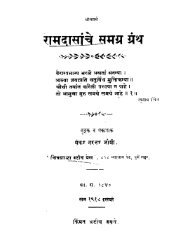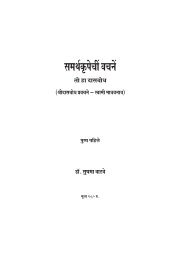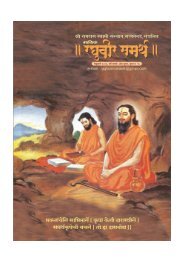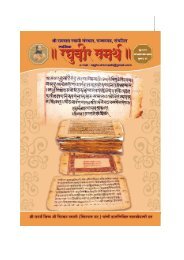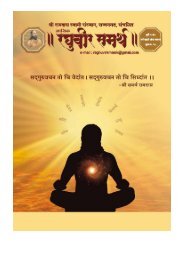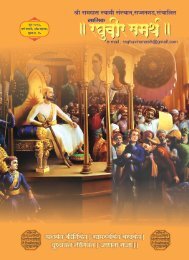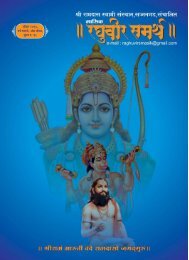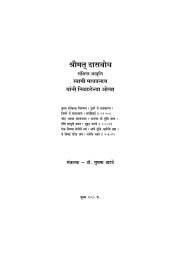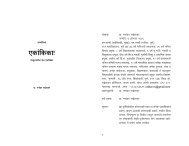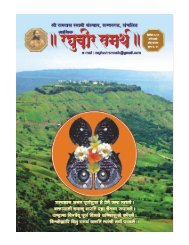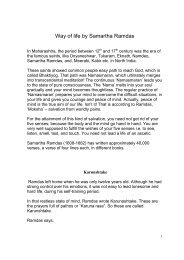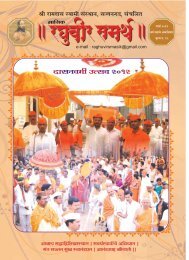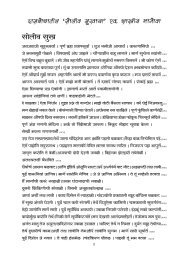THE DASBODHA BY: SADGURU SHREE SAMARTH RAMDAS ...
THE DASBODHA BY: SADGURU SHREE SAMARTH RAMDAS ...
THE DASBODHA BY: SADGURU SHREE SAMARTH RAMDAS ...
You also want an ePaper? Increase the reach of your titles
YUMPU automatically turns print PDFs into web optimized ePapers that Google loves.
Shree Samarth says that even if both of them are the correct persons<br />
but they fail to have a dialogue about the real knowledge of the self or the Atman then it is of no<br />
use either. Furthermore even when the disciple is convinced about the preaching of the Guru but is<br />
unable to maintain the Sadhana the same fate awaits him. Shree Samarth further states that this<br />
yield of the spiritualism has to be very industriously obtained and then maintained for the fear of<br />
the loss of it which is the greatest loss if anything lost in this Maya can be termed as a loss.<br />
The Sadhak should continue the Sadhana even after getting the<br />
ultimate knowledge of the self, through the blessings of the Guru; as slight negligence may allow<br />
the Maya to intrude and subsequently divert the Sadhak from his hard earned path. Therefore Shree<br />
Samarth says that pursuance of spiritualism is a comprehensive way of leading one’s life. The parts<br />
within this way are companionship of the Guru, Saints, Sages and Rishis, virtuous deeds and strict<br />
adherence to the religion whereas Sadhana, desire for the real knowledge and worship are its outer<br />
parts. The Atman reveals itself where both of these bloom fully. Absence of any of these leads to<br />
chaos where the disciple can’t be held responsible because it is the solemn duty of the Guru to<br />
improve the disciple even if it requires a total metamorphosis in the disciple’s interior as well as the<br />
exterior for the Guru is capable of anything imaginable and even beyond that. Shree Samarth says<br />
that the converse isn’t true at all. By this he subtly suggests that howsoever great the disciple may<br />
become he can’t and shouldn’t aspire to become the Guru.<br />
Shree Samarth says that in the Guru-disciple relation Guru is the<br />
major player as he is the one who is responsible for the development of the disciple. Now he tells<br />
how the disciple should be. The main attribute of a good disciple is that he should have total faith in<br />
the Guru and whatever he does or says. The disciple should be calm in any given situation, humble,<br />
pure at heart, in possession of high moral character, ethical values, Vairagya, should realize his<br />
mistakes and never commit the same again, should be utterly faithful, highly industrious, able to<br />
concentrate on the abstract, very courageous, charitable, devoted to spiritualism, without jealousy,<br />
an avid reader of all the religious philosophies, virtuous, careful in everything, intelligent,<br />
thoughtful, independent, full of love, lovable, able to behave according to the demands of the<br />
situation yet never leave the path shown by the Guru, able to discern between what is good and<br />
what is not and behave accordingly, a troubleshooter, brave, having conviction in his thoughts and<br />
deeds, a great Sadhak, worshipper of the God, able to survive any physical and mental strain, a<br />
friend of everyone, student of the knowledge of the Parbrahma and should have total belief in the<br />
existence of the God. All his senses should be concentrated and directed towards the Guru<br />
constantly with a feeling that the Guru is the only person who matters for him and whatever he does<br />
or tells is for the good of him which makes the mind of the disciple readily moldable by the Guru to<br />
acquire the ultimate knowledge of the self or the Atman or the Parbrahma.<br />
He should not be a materialistic person or a very rich one. He should<br />
have experienced grief in his life and known what it is to lead life despite the unbearable grief.<br />
There is a reason why Shree Samarth says this. The very rich live life without much thought going<br />
into it, because, that is hardly ever demanded in their life. They have only experienced happiness<br />
and haven’t seen the naked realities of life which any grief presents with. Who then in such a<br />
position would want to tread on the path of spiritualism relinquishing the happiness (Or so they<br />
think!) they already have? They most commonly say, “The ultimate bliss? What I am in today is the<br />
ultimate bliss, you don’t agree because you don’t have it!” It is almost futile to change the mindset<br />
of these people which is like hitting your head over a hard rock in the hope that the rock would




